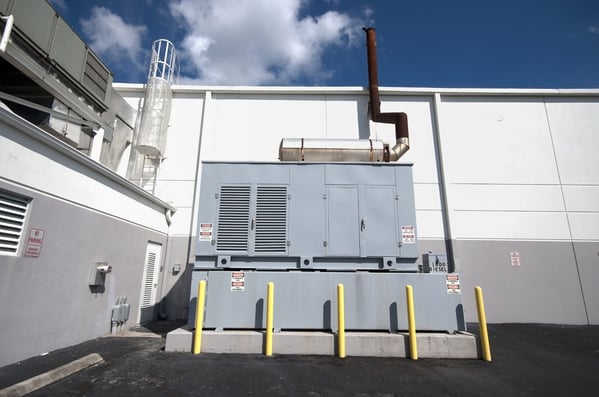Natural Gas Generators: Why Aren’t They Used More in NYC?

Diesel is the standard fuel for most emergency and standby generators in NYC. However, natural gas offers many practical advantages, which include a lower operating cost and reduced pollution. In addition, natural gas is supplied as a utility service, while diesel is not. Then, perhaps you may be wondering why natural gas generators are not used more in NYC buildings? The answer is code compliance: an on-site fuel supply is required for most generators, which favors the use of diesel.
When dealing with electric generators for buildings, it is important to understand the difference between emergency power and standby power:
- An emergency power system is used to provide backup power for loads that would create life-threatening conditions if they stop operating.
- A standby power system provides power for loads that are also important, but do not threaten human life when the power is interrupted.
Emergency power is always mandatory, while standby power can be mandatory or optional depending on the application. The NYC Building Code provides detailed requirements for both emergency and standby power systems in Chapter 27.
Is Your Emergency Generator Adequate for Your Property?
Get an building inspection to find out.
When Does the NYC Building Code Allow Natural Gas Generators?
Unfortunately, there are only two cases where the NYC Building Code accepts the gas supply from the street as the primary fuel source for generators. For all other applications, the generator must have an on-site fuel supply for at least six hours, favoring the use of diesel.
- Supplying emergency power in Group R-2 occupancies. This is the most promising market for natural gas generators in NYC at the moment, since Group R-2 includes high-rise multifamily buildings - one of the most common types of construction in the city.
- Supplying standby power, as long as the natural gas generator is isolated from other gas-fired appliances in the building with a cutoff valve.
Under the current code requirements, there are more opportunities to deploy natural gas generators in the residential sector, and not so much in the commercial sector. However, this could change if future versions of the NYC Building Code are edited, allowing use of the gas service for emergency loads in more occupancy classifications.
What Do NYC Buildings Gain By Using Natural Gas Generators?
Natural gas generators offer more load flexibility than their diesel counterparts. When diesel generators operate at low load values, they suffer from “wet stacking”, which is the ingress of unburned fuel into the exhaust system. If this condition is ignored, it can drastically shorten the service life of a diesel generator, and it also increases the soot content of its emissions. On the other hand, natural gas generators can adapt to low load conditions because they run at a higher temperature and with a gaseous fuel.

Natural gas generators are also simpler to manage from the logistical standpoint, since their fuel is supplied through a service pipe that comes from the street. On the other hand, with diesel engines it is necessary to schedule deliveries by truck. When property management companies equip their buildings with natural gas generators, there is one less issue to worry about.
Another strong point offered by natural gas generators is a reduced environmental footprint, since their emission levels for many pollutants are drastically lower than in diesel generators. For example, emission of the following air pollutants can be reduced by over 90% with a natural gas genset:
- Nitrogen oxides (NOx)
- Carbon monoxide (CO), a highly toxic gas for humans
- Volatile organic compounds (VOC)
With their reduced environmental footprint, natural gas generators can contribute towards the emissions reduction goal set forth by the NYC government: an 80% reduction by 2050, compared with 2005 emission levels.
In 2012, Hurricane Sandy revealed a key weakness of diesel generators: fuel deliveries can become impossible under harsh weather, leaving buildings without power once the diesel tanks of their generators are depleted. This is not an issue with natural gas, since it is supplied through underground piping that is not affected by the weather.
In terms of occupant comfort, natural gas generators are also the preferred option, since they produce less noise and odors. Nevertheless, both diesel and gas generators produce flue gases that are harmful for humans, and must be properly vented.
Final Recommendations
If you are considering a natural gas generator, get a professional opinion by getting in touch with an engineering consulting firm. They can tell you if the the NYC Building Code allows a natural gas generator for your project. If that is the case, they can make sure it is specified with the right capacity and installed according to NYC codes and NFPA standards.

Ankit Javeri
Ankit is the Project Manager at NY Engineers, who holds an M.Tech. Some of his projects includes Community Access, Jackson Avenue
Join 15,000+ Fellow Architects and Contractors
Get expert engineering tips straight to your inbox. Subscribe to the NY Engineers Blog below.

